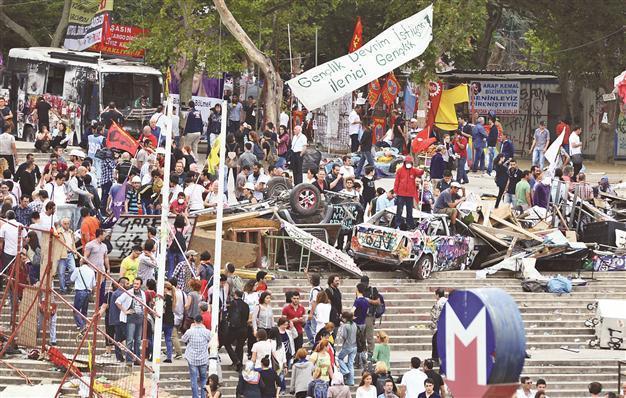Can revolution last forever at Gezi Park?
ISTANBUL - Hürriyet Daily News

The crowds at Gezi Park are not looking for a fight, but wish to resist. The rain and the storm may pose difficulties, but the protesters are keen on staying. DAILY NEWS photo / Emrah GÜREL
The morning of June 12 is not that different from any other morning for the Gezi Park crowd – they slowly start to put together their lives, tents are cleared out, blankets are put out to dry, garbage is being collected by volunteers. If one never makes it through the green spot to reach the barricade overlooking the Taksim square, made out of metal scraps and stones, one can never really grasp the fact that this place resembled a warzone only hours before.
The government’s attempt to create a rift between the nature-loving idealists inside the park and the Anthony Burgees type criminals outside of it, who faced one of the movement’s harshest crackdowns so far just the night before, is clearly way out of proportion, but that doesn’t mean a way of difference does not exist between the square and the park. The crowds within, coming out of their tents with sleepy eyes and preparing the day’s work, don’t give you the vibe of people who itch for a confrontation.
When I ask one of the protesters whether or not the people over the barricade are that different from those on this side, he tells me they are all “essentially the same,” right before he skips giving his name and introduces himself as “part of the civil initiative.”
“The reason that has changed over time is the political tents,” the 30 year-old tells me as people around him rush to photograph the list of what is currently needed in the park. “But I can’t take away credit from them, really, when the time came they stood out there, and they protected everyone.”
They had initially attempted to warn what he calls “the youth” who are not experienced in the art of protesting in Turkey, but still, some were caught off guard. The will to resist still remains however, he added, and he cracked a smile.
“Those who come know what they are getting into. There was a festival crowd once, in the beginning that thinned out after the interventions. Now everyone here is here to resist.”
“Nobody cares anymore,” he tells me bluntly when we start talking about Governor Huseyin Avni Mutlu’s statements of the day before declaring Gezi a no-intervention zone before forces entered the park. “They turned it into a child’s game. “
The help, the aunts, the youth The intervention may have left the park nearly deserted, but people begin flocking into it as soon as the day picks up. Bags and bags of groceries are brought over in the morning hours, handed over to a few of those who seem to be in charge of distribution. The morning ritual of many consists of stopping by the park beforehand and checking the needs list before heading out to stores.
A small group marches through the park, holding up books in their hands, including the works by the Turkish novelist Yaşar Kemal. Groups and individuals begin floating in – you can pick out teenagers, elderly couples, corporate types who skipped lunch to come check the action.
What keeps the movement alive essentially is that force of the constant flow of a fresh breed – a key group who stays overnight at the park is a strong fundamental, but the coming-and-going crowd is really what keeps it alive. Those who made it to the park in the early hours are ready to help, excited, fresh and willing to chip in. They care little for anything else; they are not there to take on the police, or to topple the regime. They are there to help the park – the place as much as the protesters – as best as they can, turning the sentiments of a few into a raging resistance of the common ones.
Though the rain brings out the mud and the much, the crowds seem decisive. A feeble feeling of weariness is in the crowd, but the whole movement works as if Istanbul is pulling shifts. The crowds that fight in the night get swapped by newly charged ones in the morning. As one of the hand-written signs tell you, “No weariness, but resistance.”
An incredibly strong female presence is at the park, especially of older ages. Lovingly dubbed by the crowd as “the aunts,” these women are there every day with the sun, bringing food, making meals, sharing love and devotion with the kids as they see it the only way they may contribute to the ongoing protests. One of them stands firm in the midst of confirmation and declares, “Well, we are ready, and we are not afraid.”
I return to the barricade where the crowds are watching in silence as construction trucks move in to the square. Somebody says, “This is it, this is how it starts. They’ll try to take down the barricade.”
And from nowhere young men and children begin piling up by the barricade, their faces covered, and their masks on. They stand over the metal and the stones and they look on as police forces change posts. Gezi’s spill-over crowd quickly retreat and disappear amid the green.
They are not looking for a fight.
